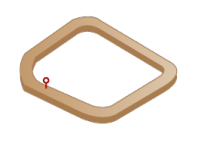Race type - Jump
Hereford
Course details
Racing at Hereford can be traced back to 1771, with the first hurdle race run in 1840. Flat racing was abandoned in 1883 and the course now stages jumps only, although harness racing takes place during the summer months.
The racing is of a modest fare but the course attracts it's fair share of visitors, situated as it is on the outskirts of the historic cathedral city which contributes its name and close to the idyllic Brecon countryside.

GUIDE - For Racecourse
Right-handed, 1m4f square-shaped circuit.
Racing at Hereford can be traced back to 1771, with the first hurdle race run in 1840. Flat racing was abandoned in 1883 and the course now stages jumps only, although harness racing takes place during the summer months. The racing is of a modest fare but the course attracts it's fair share of visitors, situated as it is on the outskirts of the historic cathedral city which contributes its name and close to the idyllic Brecon countryside. It's just a shame they don't get to see any top notchers as races are mostly contested by low grade horses.
Principal Races
Winning prize money here is normally in the region of £2k-£3k (sometimes less!), but the meeting at the end of January stages two 'valuable' (£4.5k) races: a handicap chase and a novice chase, won in 2011 by Grand Lahou and William's Wishes, trained by Tim Vaughan and Evan Williams respectively.

Course Characteristics
Due to the courses configuration, horses have to negotiate some sharp turns and this is no place to run a big, galloping animal. As you'd expect, front runners and those horses who like to race prominently fare well, although jockeys need to judge the pace well as the ground is often very soft and horses that go off too fast will not get home. Races are often won on the turn into the short straight, with the more savvy riders making a beeline for the inside rail, saving valuable ground in the process.
Top Trainers
Evan Williams has made many a successful foray over the Welsh border and he leads the way numerically with 22 winners, albeit at a modest strike rate of 12% - clearly, followers of the stable need to be selective. The aforementioned Venetia Williams has trained less winners but at a higher strike rate of 19% (19 winners / 102 runners), which is just ahead the 18% of Alan King, but a long way behind that of Rebecca Curtis, who can boast a 34% strike rate (14 / 41) and backers of all her runners would have made a £10 profit. Jonjo O'Neil is another trainer to follow, especially when stable jockey Tony McCoy is in the saddle.
Top Jockeys
A certain AP McCoy rides Hereford better than other jockey and has 'stolen' many a race on the sharp turn into the straight, scraping the paint from the inner rail and shooting his mount into an unassailable lead. With 37 winners and a strike rate of 30% in the past five seasons, he's been a real friend to punters. Richard Johnson makes the most of his opportunities too with his 27 winners coming at a strike rate of 21%. Backers of Aidan Coleman have also fared well and would have made a small profit backing his rides blind - a more selective and profitable approach would be to back him when he's riding a fancied runner trained by Venetia Williams. Robert Thornton and the unheralded Paul Moloney are other jockeys to keep on the right side of.